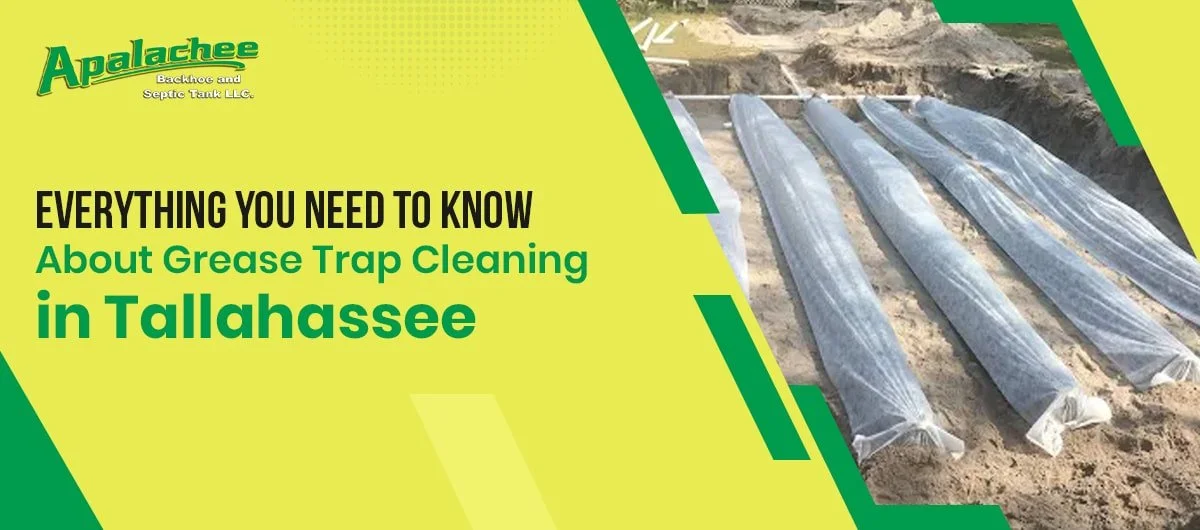Everything You Need to Know About Grease Trap Cleaning in Tallahassee
Introduction
Grease buildup is one of the common reasons for septic system malfunctions, especially in commercial kitchens and restaurants. Grease traps are the latest technologies available to reduce build-up within pipes and drainfields. However, they are difficult to maintain with a constant flow of fatty and oily substances from the household pipeline. Grease trap pumping is one of the effective ways to ensure the longevity of your septic system as well as the grease trap. Pumping also prevents expensive repairs and reduces the chances of septic system disruption.
What Is Grease Trap Pumping?
Grease trap pumping is the process of emptying and cleaning grease traps to remove accumulated grease, oil, and fatty liquids from the device, keeping it running. Grease trap cleaning is an effective method for preventing clogging within the sewer system and reducing the load on the septic system. Lower grease content allows the septic system to filter wastewater more effectively without being overwhelmed.
Why is it necessary?
Here are some of the reasons why the pumping is necessary:
Preventing clogs and backflow: Grease trap cleaning prevents trap malfunction, reduces clogging, and prevents backflow into the house plumbing system. When traps fill up, the ensuing backflow can lead to costly repairs and replacement.
Eliminating odors: Accumulated fats, oils, and grease cause pungent odors to spread throughout the house. Grease trap pumping helps remove the excess waste from the trap and reduces pungent odors.
Protecting the sewer system: Fat, grease, and oil can enter the sewer system and potentially damage the septic system. Trap pumpings can remove the fats and grease from entering the sewage pipeline.
Regulatory compliance: Grease trap cleaning in Tallahassee is mandatory through regulatory authorities. Grease trap cleaning is made compulsory for environmental protection and plumbing safety.
How does it work?
The steps for cleaning a grease trap are as follows:
Content removal: A specialized truck with a vacuum is used to remove the fatty substances from the grease traps.
Interior cleaning: The professional cleaners clean the interior of the trap to remove any remaining Fatty, oily, and greasy (FOG) materials from the machine.
Inspection: The sewer system, septic tank, and drainfields are thoroughly inspected for any presence of grease or other related contaminants.
Disposal: The contents retrieved after the pumping are disposed of at the designated facilities.
7 Important Things to Know About Grease Trap Pumping
Pumping Frequency
The frequency for grease trap pumping depends on the size of your household and the volume of wastewater generated through the kitchen and bathrooms. If you are running a commercial kitchen, you should pump your grease traps more frequently. In any case, grease traps should be pumped every 1 to 3 months, taking into consideration these factors.
Local Regulations and Compliance
Grease trap cleaning in Tallahassee is mandatory by law and in other urban areas in Florida. Grease traps have been found useful in protecting the environment and keeping the septic systems functional. Thus, local authorities insist on frequent and regular grease trap pumping for maintaining a healthy plumbing and septic system.
The 25% Rule
One of the significant thumb rules for grease trap cleaning is the 25% rule, which states you should schedule your pumping when your trap is 25% full. Following this strategy will help you prevent disruptions and overwhelm the device and sewage system.
Need for Professional Pumping
Hiring professional grease trap cleaners is a better strategy for cleaning your trap than doing it yourself. Grease traps are complex devices, and DIY methods could damage their inner machinations. Professional cleaners have modern devices made for pumping your grease traps.
Don’t Avoid Maintenance
Grease trap pumping is an essential part of maintenance, and ignoring it can have adverse consequences. Grease can form hard substances inside the traps if it is allowed to accumulate, causing blockages and other serious plumbing issues. In a commercial space, backflows could disrupt the workflow during rush or peak hours.
Grease Trap Pumping is Affordable
Grease trap pumping is more affordable than you think. Firstly, it saves costs on expensive plumbing repairs by preventing clogging, backflow, and potential leaks. Secondly, it prevents contaminants from flowing into the house, and thus the health risks are low. Thus, the long-term investments are worth the price even though initial costs are higher.
Proper Waste Disposal Practices
Waste disposal practices should be environmentally sustainable so that it doesn’t contaminate any ecosystem. Follow regulations passed down through the authorities and maintain environmentally sustainable practices while disposing of residual FOG.
Conclusion
Grease trap pumping should be a maintenance practice that all property owners should prioritize. Grease trap pumping not only protects your sewage and plumbing systems but also brings your property into compliance with local laws and regulations. Choosing the proper professional service to maintain your grease trap is key to quality service. Apalachee Backhoe and Septic Tank LLC is a septic service serving Tallahassee and other major urban areas of Florida. With over 30 years of experience in this field, we offer a quick response, qualified and licensed professionals, personalized solutions, and transparent pricing. We are committed to providing solutions that save customers long-term costs for their sewage issues and ensure that your systems comply with the laws. Book our services at https://www.apalacheeseptic.com/pipeline-services.

